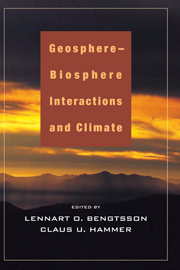Book contents
- Frontmatter
- Contents
- Dedication to Hans Oeschger
- List of Contributors
- Preface
- Introduction
- 1 The Antarctic Ozone Hole, a Human-Caused Chemical Instability in the Stratosphere: What Should We Learn from It?
- PART ONE THE ANTHROPOGENIC PROBLEM
- PART TWO THE HUMAN PERSPECTIVE
- PART THREE MODELING THE EARTH'S SYSTEM
- PART FOUR INFORMATION FROM THE PAST
- 12 The Record of Paleoclimatic Change and Its Greenhouse Implications
- 13 Long-Term Stability of Earth's Climate: The Faint Young Sun Problem Revisited
- 14 Physical and Chemical Properties of the Glacial Ocean
- 15 Ice Core Records and Relevance for Future Climate Variations
- PART FIVE HOW TO MEET THE CHALLENGE
- Index
- Plate section
15 - Ice Core Records and Relevance for Future Climate Variations
Published online by Cambridge University Press: 04 August 2010
- Frontmatter
- Contents
- Dedication to Hans Oeschger
- List of Contributors
- Preface
- Introduction
- 1 The Antarctic Ozone Hole, a Human-Caused Chemical Instability in the Stratosphere: What Should We Learn from It?
- PART ONE THE ANTHROPOGENIC PROBLEM
- PART TWO THE HUMAN PERSPECTIVE
- PART THREE MODELING THE EARTH'S SYSTEM
- PART FOUR INFORMATION FROM THE PAST
- 12 The Record of Paleoclimatic Change and Its Greenhouse Implications
- 13 Long-Term Stability of Earth's Climate: The Faint Young Sun Problem Revisited
- 14 Physical and Chemical Properties of the Glacial Ocean
- 15 Ice Core Records and Relevance for Future Climate Variations
- PART FIVE HOW TO MEET THE CHALLENGE
- Index
- Plate section
Summary
Introduction
Any human-induced changes in climate will be superimposed on a background of natural climatic variations. Hence, to understand future climatic changes, it is necessary to document the spatiotemporal patterns and causes of natural climate variability. As useful as instrumental studies may be, they are limited by the available data record, which generally extends back less than 150 years. This duration is too short to extract the full range of possible climate system variability and to understand the mechanisms involved in climate changes operating at various time scales. For example, the paleoclimatic record has already provided multiple examples of how the climate system is capable of unprecedented abrupt changes that did not occur during the period of instrumental observations and thus can be studied only via the paleoclimatic record.
The aim of this chapter is to examine how our increasing knowledge of past climate changes contributes to gaining information relevant to the future of our climate. Our current understanding of past climate changes is based on a combination of two things: paleo data provided by ice core, marine, and continental records; and a modeling approach. It is this combination that is most useful for narrowing uncertainties associated with detecting and predicting climate change (see Overpeck, 1995, for a recent review).
- Type
- Chapter
- Information
- Geosphere-Biosphere Interactions and Climate , pp. 256 - 270Publisher: Cambridge University PressPrint publication year: 2001
- 1
- Cited by



